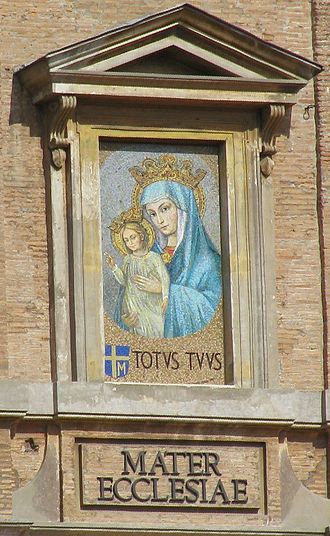
Today the readings are in celebration of Mary, Mother of the Church. If this is a new title for Mary to you, you are not alone. Pope Francis instituted this memorial in the universal church just last year.
What was Mary’s role at Pentecost?
The answer is found in Acts 1: 12-14, though that is not the primary choice for our first reading for today. The apostles returned from the Ascension and:
Then they returned to Jerusalem from the mount called Olivet, which is near Jerusalem, a sabbath day’s journey away; and when they had entered, they went up to the upper room, where they were staying, Peter and John and James and Andrew, Philip and Thomas, Bartholomew and Matthew, James the son of Alphaeus and Simon the Zealot and Judas the son of James. All these with one accord devoted themselves to prayer, together with the women and Mary the mother of Jesus, and with his brethren.
Mary was part of the original novena, the prayer that Jesus asked his disciples-soon-to-be-apostles to do until the Holy Spirit would come.
Since the disciples were praying with Mary in the upper room when Pentecost happened, the church has traditionally taught that Mary was present at the birth-day of the Church. Her prayer and presence were part of God’s plan to carry on Jesus’ mission.
A Little History and Explanation
While the title “Mary, Mother of the Church, was first used by St. Ambrose of Milan in the 4th century, it was officially introduced by Blessed Pope Paul VI in his closing address to the third session of the Second Vatican Council. On November 21, 1964 he said: “For the glory of the Virgin and our consolation, we proclaim Mary the Most Holy Mother of the Church, that is, the Mother of the whole People of God, both the faithful and the pastors.”
I like this title for Mary, and, in these days of divisions, scandals, and exoduses from the Church, it seems a title (and role) for Mary that we need. We NEED a mother—a mother who loves everyone, even when they’re fighting; a mother who knows that whatever the battle of the moment, if settled, it can be soon forgotten; a mother who can find you, over in the corner, sobbing, and know just what to say or do to make it better; a mother who nonetheless seeks to bring her children up to know, love, and serve their Father and their brother, Jesus.
In his encyclical Redemptoris Mater, St. Pope John Paul II explained how Mary functions in this model:
Mary is present in the Church as the Mother of Christ, and at the same time as that Mother whom Christ, in the mystery of the Redemption, gave to humanity in the person of the Apostle John. Thus, in her new motherhood in the Spirit, Mary embraces each and every one in the Church, and embraces each and every one through the Church. In this sense Mary, Mother of the Church, is also the Church’s model. Indeed, as Paul VI hopes and asks, the Church must draw “from the Virgin Mother of God the most authentic form of perfect imitation of Christ.”
Today’s Readings
Our two readings today give us more reasons to see and depend on Mary in this role.
Our first reading from Genesis speaks of the enmity between the serpent and Eve. It reminds us that from the beginning of time, mothers, who too often have fallen victims of evil themselves, must be vigilant and dedicated to protect their children. It recalls also John’s vision in Revelation of “the woman’s” victory over Satan. That woman in Revelation is seen to be Mary. Mary was without sin, the Mother of God, and is Queen of Heaven. She has tools to overcome evil in her children, us, that we need. She has tools we do not have.
The Gospel reminds us that at the crucifixion Jesus gave his mother to John, and John to his mother. Our church teaches it was not a simple act of making sure Mary would have a home and love—though it was doubtless that. John was one who would become an apostle on Pentecost. He would be sent. Mary, also present as the Church was born, would also be sent…to be a mother to John, to the emerging Church, and to us today.
Online I found some beautiful, yet complicated prayers to Mary, Mother of the Church. Yet today I am drawn to the Memorare. Maybe I can pray that every time I open up email or Twitter and see invective within our church family, every time someone gossips about priest or musician or how the festival is planned this year, and every time I am needy, hurt, or just in need of a tender touch.
Mary, Mother of the Church, pray for us!
Prayer: The Memorare
Remember, O most gracious Virgin Mary, that never was it known that anyone who fled to thy protection, implored thy help, or sought thine intercession was left unaided.
Inspired by this confidence, I fly unto thee, O Virgin of virgins, my mother; to thee do I come, before thee I stand, sinful and sorrowful. O Mother of the Word Incarnate, despise not my petitions, but in thy mercy hear and answer me.
O Mary, Mother of the Church, protect and guide us all. Amen.
